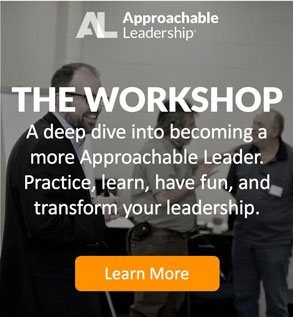Fred Rogers Makes $20 Million in 10 Minutes by Being Approachable
Tom Hanks is earning rave reviews from both audiences and critics for his portrayal of Fred Rogers in “A Beautiful Day in the Neighborhood.” There is a lot of talk about an Oscar nomination, which is well-deserved. Like the man Fred Rogers himself, the movie seems both completely out of step with today’s world; at the same time it seems like exactly what we need. Its tag line is “we all could use a little kindness.” You can say that again.
One of the best things to come out of this movie is not just Hanks’ amazing portrayal of the man. It also reminds anyone who grew up in the “neighborhood” (plus new generations getting introduced to him for the first time) of all the things Rogers taught and stood for.
I never really thought about Rogers as a leader until I saw this video a few years ago. In less than 7 minutes Rogers turns around a skeptical and dismissive audience of Senators and earns the PBS network $20M of funding. This funding not only helped Rogers continue doing his terrific work, but also funded other children’s programming that positively impacted the lives of generations of children (Sesame Street’s first episode aired the year after this testimony).
There are a number of approachability lessons in this testimony. Here are a few that stand out to me:
1. Don’t Take the Bait: Right off the bat Senator John Pastore tries to bait Mr. Rogers into an argument. He taunts him to read his testimony instead of having the conversation that Rogers hopes to have. Rogers doesn’t take the bait. Each time the Senator exhibits aggression or sarcasm Rogers calmly and directly responds. He’s not just sticking to the message – he is testifying from a place of deep caring. Rogers is quietly confident that once Senator Pastore understands the great work Rogers and his team are doing in the lives of young children he will be on board.
2. Make the Hero Assumption: Rogers makes the hero assumption about Senator Pastore. He understands that the Senator has a job to do and wants to be careful with taxpayer funds. He expects to face hard questions. But Rogers also believes strongly that the Senator cares about the lives of children, what they are consuming in the media, and shares his concern about their mental health (and this is 1969, not 2019!) He helps the Senator do his duty to the purse by explaining why the investment in his low-budget programming is both superior and much cheaper than violent cartoons. He then gives examples of the practical and powerful lessons he teaches instead.
3. Lead by Example: The most powerful part comes at the end, where Rogers quotes the lines from a song he wrote about how a child can deal with anger by exercising self control. The power of this lesson is palpable as you watch the Senator transform before your eyes. He understands Rogers isn’t just being a good example for children – he’s epitomizing how all of us should act and treat each other. As neighbors.
4. Competence AND Connection: Rogers comes armed with a long paper that covers his philosophy and cites numerous facts during his discussion with Pastore. He clearly knows his stuff, and encourages the Senators in the room to educate themselves. But he quickly turns to what’s more important, connecting with the Senators and making sure they connect with his mission of caring for children. If he only focused on one or the other he would not have won the committee over.
We live in a time where Fred Rogers’ lessons and life’s work are more relevant than ever. Each of us is unique and special and here for a reason. We should treat each other with kindness, caring and understanding. We should help each other. And we create good neighborhoods (and countries for that matter) by being good neighbors. Those are lessons that stand the test of time.
What are some other leadership lessons you remember from Mr. Rogers’ Neighborhood? Let me know in the comments.










